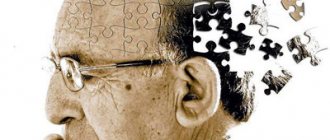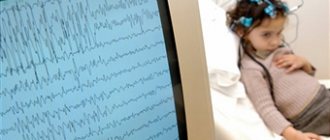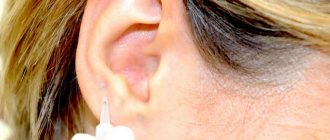Living with someone with Alzheimer's is very difficult, especially if the disorder is already in one of the last stages and seriously changes the person's behavior. It is difficult to show restraint and patience when faced with causeless aggression, constant suspicion, and inappropriate behavior. It often seems to those caring for the patient that he is acting quite deliberately, trying to make him as angry as possible. In reality, the behavior of Alzheimer's patients is always determined by the characteristics of the disease and they are simply not able to control themselves.
Features of the development of the disease
The disease is a slowly progressive disease. The process of degeneration of brain neurons is irreversible. Due to the nature of the damage to areas of the brain, the patient’s memory is primarily affected during the disease process. The disease develops slowly, and over time there is impairment of the cognitive functions of the brain and progressive dementia.
Depending on the stage, symptoms vary. Life expectancy with the disease depends on the current stage of the disease. The following stages of pathology are distinguished:
- initial;
- moderate;
- heavy.
At each stage of development of the pathology, the patient experiences symptoms of varying severity. The initial stage of the disease, in turn, is divided into several stages, allowing you to get a complete picture of the symptoms at the onset of the disease.
What do older adults with Alzheimer's disease need to support their mental health?
- Strong intellectual stress helps maintain adequate cognitive activity, and therefore prolongs the life of people with Alzheimer's disease. Researchers have found that those who have a higher education develop this disease less often, since they are characterized by more developed neural connections than those who did not engage in mental work. Therefore, as a preventive measure, it is vital to “pump up” cognitive skills. However, in the case of very mature people, it is important not to overdo it, due to the fact that overload of mental activity is just as harmful for old people as its lack.
In nursing homes in the Leningrad region, the following types of activities are often used as leisure for residents:
- game of chess;
- collective crossword solving;
- reading (including reading aloud);
- short, easy foreign language lessons (including watching cartoons in a foreign language);
- learning songs and poems;
- listening to music;
- watching and discussing films;
- activities that develop fine motor skills (including modeling, drawing, and other types of arts and crafts);
- and others.
Any leisure activities help to increase the emotional background, especially creative activities aimed at obtaining positive feelings. In collective therapeutic lessons, people stop feeling lonely and communicate freely with each other. It is important to note that older people have the opportunity to choose what exactly and when exactly to do, the staff takes into account their wishes, trying to involve the elderly in those activities that are new to them, which contributes to the formation of new neural connections and is the prevention of further development of the disease Alzheimer's.
- Reasonable physical activity has a positive effect on brain activity, tissue nutrition and metabolism. Therefore, the daily routine of nursing homes must include:
- medical and physical training complex;
- breathing exercises (promotes long-term preservation of swallowing reflexes and speech skills);
- walking;
- in the warm season - sunbathing.
- To maintain brain function at a satisfactory level, a proper diet is extremely important for elderly patients. It is beneficial for old people to eat fish, herbs (especially parsley and spinach), vegetables (carrots, bell peppers), legumes and grains. When preparing dishes, it is advisable to use iodized salt. Nutritionists believe that apples contain microelements that can prevent the production of beta-amyloid, which affects the speed of transmission of nerve impulses. This is partly why fruits and fruit juices occupy a large place in the menu of private homes for the elderly. Traditionally, for guests of the “age of happiness” it is recommended to exclude fatty, peppery, fried, sweet foods made with refined sugar and white flour.
- Medical procedures are an integral part of life in nursing homes in St. Petersburg. Elderly people are regularly examined by doctors, including specialists, including a psychiatrist and a neurologist; patients undergo tests, and after a certain period undergo the necessary studies: computed tomography of the brain, electrocardiography, electroencephalography. They are prescribed vitamins and medications prescribed by a doctor, and preventive measures are taken to prevent concomitant diseases (pathologies of the cardiovascular system, hypertension, osteoporosis, diabetes, problems with hearing, vision, and others).
Initial stage of the disease
The early stages are often called predementia. At this stage, there are no obvious symptoms of dementia, which greatly complicates the diagnosis.
The initial stages are conventionally divided into three stages:
- preclinical phase;
- minor disturbances in brain function;
- initial symptoms of mild dementia.
The preclinical stage is characterized by the onset of a pathological process in the brain. Moreover, the changes are so insignificant that no visible manifestations of the disease are observed. The pathology in this case can be diagnosed accidentally during examination. At the same time, there are no obvious neurological disorders; the patient’s behavior and memory do not change in any way.
At the next stage, minor disturbances in brain function occur. This is accompanied by mild impairment of memory and cognitive functions. As a rule, patients at this stage of the disease do not go to the doctor, explaining the slight weakening of memory as a natural process of aging. Relatives and friends of patients do not notice any changes.
The initial symptoms of mild dementia allow one to confidently diagnose the development of the disease. This stage is accompanied by the following symptoms:
- weakening of memory;
- character changes;
- difficulty in making decisions;
- weakening of analytical abilities.
The patient is unable to make decisions with confidence or engage in any intellectual activities.
Advice for relatives of older people with memory impairment
- Maintain a friendly, calm atmosphere in your home by all means.
- Avoid moving from apartment to apartment. If your family decides that a grandparent with dementia needs quality care in a modern nursing home, move with him the things that surrounded him: clothes, souvenirs, photo albums, dishes. In the Ropsha boarding house, there were cases when an elderly person moved along with his curtains, an armchair, his favorite blanket and a rug in front of the bed. This is the right approach for this disease: by maintaining stability and comfort for the patient, we relieve him of most of the negative emotions and experiences.
- Minimize noise around the person with Alzheimer's disease. Increased volume and the presence of a large number of sound stimuli cause mood swings in older people with dementia, causing deterioration in health.
- When talking to a grandparent with a brain disorder, remember that the words and phrases you use should be simple and understandable even to a child. If the elderly person still does not understand you, repeat, trying to speak clearly, calmly and loudly enough.
- If negative emotions or signs of hysteria appear, try to switch the patient’s attention to something pleasant for him. Do not support emerging conflicts, even if there is an objective reason for them.
- Do not refuse any help, involve patronage nurses and other relatives in your care, send the patient to a specialized boarding house during your vacation. Emotional burnout of people caring for terminally ill patients for a long time can become the basis for neurotic manifestations and long-term depression.
Memory loss
Memory loss in Alzheimer's disease does not happen overnight. First, there is a weakening of short-term memory, which is responsible for the process of memorizing new information. The patient's relatives may notice that the patient cannot recall in his memory what he was told recently. A striking example: having voiced a request to a patient to do something the next day, relatives note that the next day the person forgot about this request.
Over time, the patient himself begins to diligently use reminders, for example, writing down plans in a notebook.
Often patients are not able to be critical of their own health, so they do not notice the problem. There are other cases where patients deliberately hide memory problems from their environment.
Over time, the problem worsens and impairments in long-term memory are observed. An example of such a disorder is the patient’s inability to remember any recent event. At the initial stages, memory returns if you ask the patient a few leading questions that would help restore the picture of recent events.
The early stage of mild dementia is characterized by forgetting names, street names, and some specific terms. Patients' speech changes due to the inability to quickly remember the right word.
Psychological fatigue
— How to cope with burnout syndrome for those caring for a patient with Alzheimer's?
— Just like for parents with many children, it is very important for those caring for such patients not to do this 24/7, seven days a week. So it won’t be long before neurosis and depression. You must remember to set aside at least a little time to simply recuperate, get some sleep, etc. I know an example where the wife of a patient with very problematic behavior rallied all her friends and relatives around her family: they picked him up for a couple of hours several times a week, drove him around the city and occupied him with other things, and she could rest. In fact, there may not be as few people ready to help as it seems. You need to not isolate yourself and ask for help.
— What are the most common myths about Alzheimer's? Which of the persistent opinions about this disease is completely untrue?
— First of all, it is wrong to think that dementia is the norm for old age. This is always a disease, and you should not ignore its signs even at 90 years old. There are also various myths that Alzheimer's disease affects only the stupid or only the smart, or those who have not eaten properly, or who have had a lot of stress.
The disease usually has many causes, and we cannot say for sure what exactly triggered the pathological processes in a particular person. It is very rare that a mutation of one specific gene is found, this is less than 10% of cases. In the rest there is no single reason.
A cup of coffee? What does this drink give to the elderly Read more
Stage of moderate dementia
Starting from the second stage of moderate dementia, there is a decrease in intellectual abilities. First of all, this can be noticed by the way the patient pays in the store. Patients often have difficulty counting money; calculating the amount of change for a patient is very problematic.
The next stage is deterioration of speech. If during initial dementia the patient tries to replace forgotten words with synonyms, which makes speech pretentious and a little theatrical, at the second stage of the disease there is a poverty of vocabulary. The patient prefers to have conversations on everyday topics and avoids specific topics of conversation. He answers questions in monosyllables, without going into explanations.
In mild cases, the patient can still write and read, but these skills are completely lost at the stage of moderate dementia.
The ability to self-care is reduced, but not completely lost. The patient’s actions need to be monitored, otherwise he chooses clothes that are not suitable for the weather or may forget about such everyday things as the front door not being closed or the iron not being turned off.
As the disease progresses, urinary or fecal incontinence is often observed, due to the fact that the patient simply forgets to go to the toilet.
Keep your home safe
Patients with Alzheimer's are characterized by memory impairment and loss of coordination of movements and spatial orientation. Taken together, these factors can significantly increase the patient's risk of injury.
To avoid this, make your home as safe as possible for your sick relative. Protect him from harm by preventing the patient from using household appliances and the gas stove unattended. Do not allow the patient to easily find sharp, breakable or piercing objects. If you live on a high floor, make sure that the window is not left open.
Severe stage of the disease
The last stage of Alzheimer's disease becomes fatal. At this stage, the following violations are observed:
- the ability to self-care is lost;
- the function of swallowing food is impaired;
- all reflexes are disrupted;
- no speech;
- intellectual abilities are completely absent.
As a rule, the last stage of the disease leaves the patient bedridden. He cannot move independently and there is constant muscle rigidity. The patient cannot hold his head up or eat. Speech is completely absent, but at times the patient can pronounce individual sounds or words.
As a rule, death occurs due to the addition of an infection that the exhausted body cannot cope with.
A good sense of humor will be appropriate
Everyone knows the phrase: “Laughter prolongs life.” A good mood and what gives it - good jokes, smiles - can work wonders. Appropriate humor will be an effective way to combat stress. Laughter can also help relieve stress. Never be afraid to laugh with the patient - he will perceive this as support and understand that he is not alone.
It is important to understand!
Do not laugh at the patient under any circumstances. This can only create a gap between you.
Treatment of severe disease
The pathology cannot be treated; degenerative changes in the affected areas of the brain are irreversible. In late-stage Alzheimer's disease, the prognosis largely depends on the patient's care.
The severe stage of dementia is accompanied by physical and mental exhaustion of the body, which means the risk of death increases many times in the absence of proper care.
Supporting a patient at the last stage of pathology development consists of the following measures:
- ensuring regular feeding;
- hygiene procedures;
- assistance in meeting the physiological needs of the body;
- ensuring a comfortable microclimate in the patient’s room;
- organization of the regime;
- psychological support;
- symptomatic treatment.
Due to exhaustion of the body, patients are prone to colds and infectious diseases. It is important to treat all complications in a timely manner - this will prolong the patient’s life.
If the patient is bedridden, but has not yet lost the ability to speak and eat, it is important to provide physical and mental stress. For this purpose, it is recommended to read aloud, solve riddles together, and simple exercises that can be performed without getting out of bed. The patient's brain needs to be strained, thereby maintaining its functions. To do this, you can use simple logic problems, riddles, and solve crossword puzzles together. Doctors recommend learning nursery rhymes with the patient and playing with words. The longer the patient maintains the ability to speak and be aware of what is happening, the longer he will live.
Support patient independence
The longer a person with Alzheimer's maintains their independence, the better off they are. In this way he maintains a sense of self-respect. This is useful for relatives because it is easier to care for an independent person.
Help your sick loved one maintain their self-esteem. Your actions, deeds and words can disturb the patient, offend and even offend.
It is important to understand!
Do not make comments about a patient with Alzheimer's and do not discuss his condition with others in his presence.









